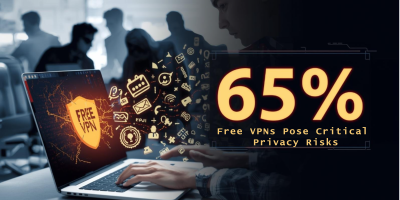Did You Know that 65% of Free VPNs Pose Critical Privacy Risks
In today’s hyper connected world, a VPN might not be just a luxury, it can be a necessity.
Whether you’re protecting sensitive business data, bypassing geo-restrictions, or just browsing anonymously, VPNs promise a shield of security. But what if that shield is more like a sieve? Recent findings reveal a startling truth: 65% of free VPN services pose critical privacy risks. The very tools designed to safeguard your privacy may be secretly undermining it.
The Illusion of Safety: Why Free VPNs Are a Double-Edged Sword
When you opt for a free VPN, you’re seduced by the idea of zero cost and instant access. But beneath that shiny veneer can be a murky reality. Many free VPN providers monetise their service in ways that directly threaten your privacy, often more than they protect it.
Why? Because free services need revenue. They often turn to invasive data collection, aggressive advertising, or selling user data to third parties. The promise of anonymity becomes a hollow claim when your browsing habits are up for sale.
Data Collection and Selling: The Hidden Cost of 'Free'
Most free VPNs operate on a business model that relies heavily on data monetisation.
They track your online activity, logging your IP addresses, browsing history, and even the content you access. And then?
They sell this data to advertisers or other third parties.
This is where the risk skyrockets, instead of shielding your privacy, these VPNs become conduits for data leaks, making you a product rather than a protected user.
Security Flaws and Malware Risks
Not all free VPNs are created equal, some can be dangerous. Several have been found to contain malware, adware, or malicious scripts that can infect your device, others have weak encryption protocols, leaving your data vulnerable to interception.
In some cases, free VPN apps have been caught installing tracking cookies or even hijacking your device for botnets. The irony? A tool meant to secure your digital footprint could be the very thing that exposes it.
Logging Policies and Lack of Transparency
One of the biggest red flags with free VPN providers is their lack of clear logging policies. Many don’t specify what data they collect or how long they retain it. Without transparency, you’re essentially flying blind.
Trusting a VPN with your privacy requires confidence in their policies. When those policies are opaque or non-existent, it’s a gamble with your personal data.
The Cost of ‘Free’ in the Digital Age
It’s tempting to think “free is free,” but in the realm of online privacy, that’s rarely the case. Free VPNs often come with hidden costs: compromised security, data leaks, and exposure to malware. The real investment should be in a reputable, paid VPN that prioritises user privacy and employs robust security measures.
What Should Companies and Users Do?
For businesses and individual users alike, the takeaway is clear: don’t fall for the free VPN trap. Prioritise providers with transparent policies, strong encryption standards, and a proven track record of respecting privacy.
Investing in a reputable VPN isn’t just about access, it’s about trust. Your privacy and security are worth it.
Final Word: Protect Your Digital Identity
The promise of free VPNs is alluring, but the risks are real and often hidden. As the recent report highlights, more than half of these services pose critical privacy threats. Before you click “connect,” do your homework. Choose wisely, your privacy depends on it.
Source: https://www.digit.fyi/report-65-of-free-vpns-pose-critical-privacy-risks/

CONTACT US FOR Digital Risk Management
You can be absolutely sure of a confidential, trustworthy and discreet service at all times, Evidence IT delivers results.
Contact us